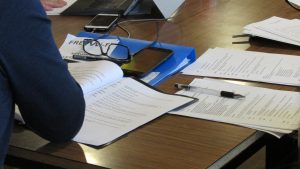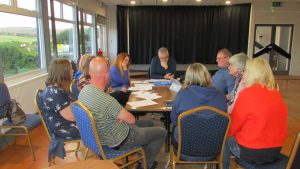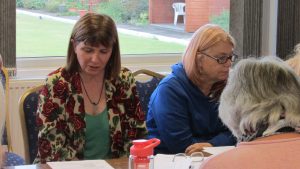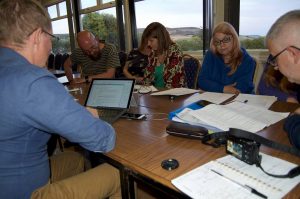Writer’s Diary: Michael Crowley
A company is emerging. Actors, a costume designer, people interested in taking on stage management, props, marketing, front of house. This from a launch event at Heptonstall bowling club on August 18th, then people messaging me on social media, phoning me, asking how they can be involved. I have, as I thought I would have, more women coming forward to perform than men. But I have tailored the script to include what I believe is a credible female narrative, one that earns its keep dramatically. I am still one or two male actors short but I am confident they will come.
Last week Sky Arts emailed to say they were planning to run a festival at the Barbican Centre in London as a showcase of the projects they were funding, enquiring if we could perform some scenes and how many actors I would be bringing. It is an exciting opportunity but the greater opportunity I believe lies in the six months ahead of a community company working collaboratively to forge a piece of theatre, set in the place in which we live during the greatest upheaval in England since the Norman Conquest.
The Lord hath done such things amongst us as have not been known in the world these thousand years. Oliver Cromwell, 27th January 1654
On Thursday evening this week the emerging cast and myself sat down in the bowling club to read the early scenes from my first draft. It was for me an enjoyable and useful couple of hours. We got to know each other, I heard their voices, they met the characters and the story. We’ll continue in the same vein for the next few weeks as the script comes off the printer and then off the page, shaped by the voices around the table. Cast member Adrian Lord kindly removed the definite and indefinite articles before nouns in his dialogue to create a vernacular sound to the script. i.e. he made it sound Yorkshire, which wasn’t always how I had written it. Another cast member asked the fundamental question, ‘why are we making this play?’Adrian’s answer was that his ancestors were in the village at the time of the battle and he has been looking for them for many years. I hope he finds some part of them in the play. He has also kindly written the piece below for the blog page.
Why Join the Brutish Multitude?
A few years ago, I started researching my family history. My links to Heptonstall stretch back over 400 years on all sides of the family. I now live a few hundred yards from Slack Top where my natural father’s name Robertshaw is thought to have originated in the 1400s.
At the start of my research I had always assumed that prior to soldiers participating in The First World War the village was largely a self-contained rural idyll and would not have been significantly affected by national or global events. As I became more involved in family history it became obvious that the woollen industry has long operated across international boundaries, with wool traded across the whole of England and cloth exported to the Low Countries. Inevitably the everyday lives of ordinary citizens have thus been bound to events beyond their control, family fortunes made and lost due to bad weather, ill health, politics or warfare. One thing that is evident even from the bare evidence of Parish and Census records is the kindness and protection of the village community as an extended family in times of need, and the strong tradition of clubs and societies for entertainment and education which continues to the present day.
Michael Crowley’s script has a strong resonance with modern politics and warfare across the world, where ordinary people trying to cope with the everyday hardships of life suddenly find themselves forced to participate in an escalating situation beyond their control and understanding, radicalised by religion and politics, or bound by personal loyalties.
Cast member Adrian Lord, September, 2018




